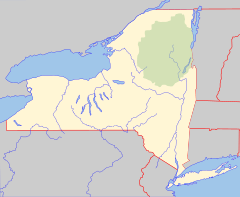Spier Falls facts for kids
Quick facts for kids Spier Falls |
|
|---|---|
| Lua error in Module:Infobox_mapframe at line 185: attempt to index field 'wikibase' (a nil value). | |
| Location | ESE of Corinth |
| Coordinates | 43°14′05″N 73°45′24″W / 43.2347948°N 73.7567869°W |
| Elevation | 407 ft (124 m) |
| Watercourse | Hudson River |
Spier Falls is a waterfall on the Hudson River in Essex County, New York. It is located east-southeast of the Village of Corinth. The Spier Falls Dam was built here to provide hydroelectric electricity.
Contents
Spier Falls: A Powerful Waterfall
Spier Falls is a natural waterfall found on the famous Hudson River. Waterfalls are places where river water flows over a steep drop, creating a beautiful and often powerful sight. Spier Falls is not just a natural wonder; it also plays an important role in making electricity for people.
Where is Spier Falls Located?
You can find Spier Falls in Essex County, New York. It is located a bit to the east-southeast of a small village called Corinth. This area is part of New York State, known for its beautiful rivers and landscapes. The Hudson River, where the falls are, flows through a large part of eastern New York.
The Spier Falls Dam and Electricity
One of the most important things about Spier Falls is the Spier Falls Dam. This large dam was built right at the waterfall. Its main job is to help create hydroelectric power. Hydroelectric power is a way to make electricity using the force of moving water. It's a clean and renewable energy source, meaning it doesn't pollute the air and we won't run out of it.
How Does Hydroelectric Power Work?
Making hydroelectricity is quite clever! Here's how it generally works at places like Spier Falls:
- A dam is built across a river, creating a large lake or reservoir behind it.
- Water from this reservoir is then sent through large pipes called penstocks.
- The fast-moving water spins giant machines called turbines.
- These spinning turbines are connected to generators, which then produce electricity.
- The electricity is sent out through power lines to homes and businesses.
This process uses the natural flow of the river to create power, making it a very efficient way to get energy.



